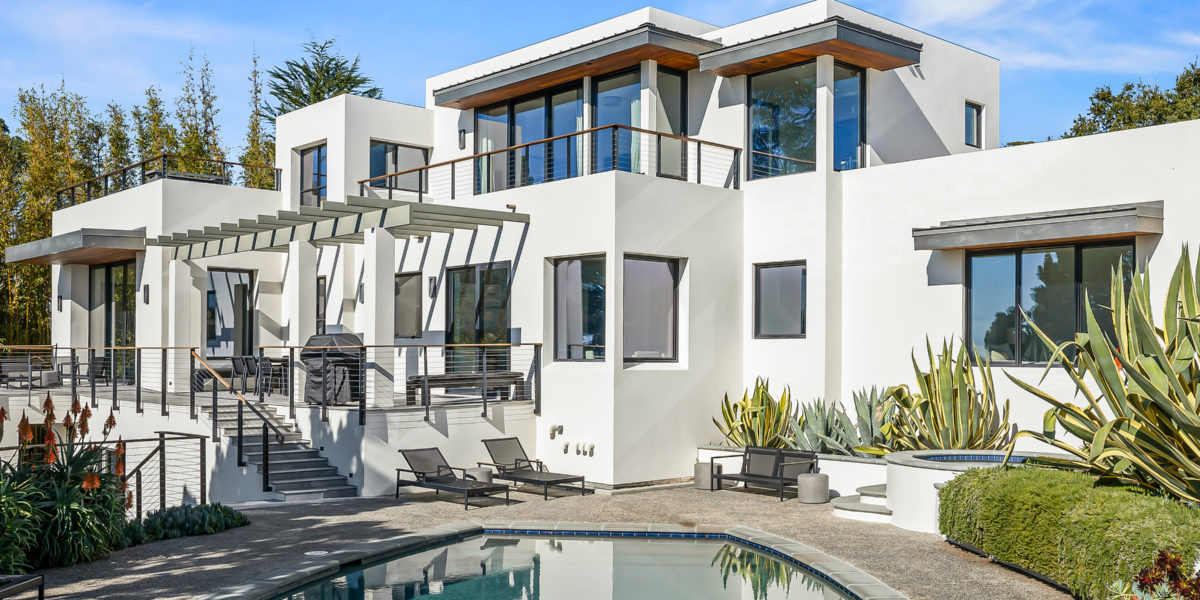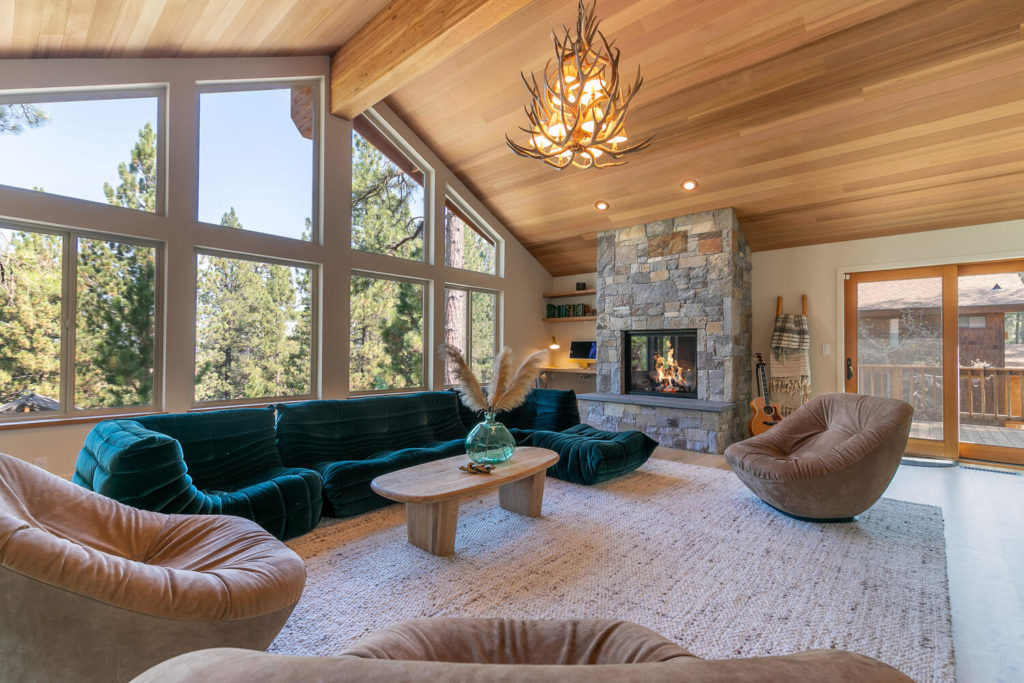
A Guide to Pacaso Vacation Homes, and Why You Keep Hearing About Them
A housing market stoked by a post-pandemic landscape of work and living flexibility has created a budding network of second-home customers.

Owning a second home is a dream for many, but one budding real estate company is out to turn fantasy into reality by redefining accessibility in the vacation home market. Pacaso sells luxury properties across the West—from Southern California to Bend, Oregon—to groups of co-owners; while going in on a second home with others is nothing new, Pacaso hopes to entice prospective buyers with a fully-managed approach that removes the headaches that often stem from tedious home operations and potential disagreements.
“You just show up and relax,” company spokesperson Chrissy Bruchey told Sunset.
Launched in October 2020 by former Zillow executives Austin Allison and Spencer Rascoff, Pacaso quickly became the talk of the town in select communities across the region following its purchases of luxury homes that are then sold by the company to multiple owners.
Pacaso currently operates in more than 35 destinations around the globe, including California hot spots like Santa Cruz and Palm Springs. However, not all communities have welcomed the real estate company with open arms. Still, with recent expansions into the Pacific Northwest and Hawaii, Pacaso is showing no signs of slowing down.
“In 2022, we will be focused on accelerating growth, while making further investments in technology to enhance the Pacaso owner experience, increasing our supply of luxury listings, expanding into approximately 30 new markets globally and aggregating buyer demand,” Allison said in a release.
With pushback in some communities, you may be wondering: How does ownership in a Pacaso property actually work? We delved into the brief but lucrative history to find out.
Owning a Pacaso
Shopping for a share of a Pacaso property is made simple from the start. Prospective buyers browse from a curated list of homes through the company’s website, each of which has been purchased via a newly established limited liability company, or LLC, designed to facilitate sales for eventual owners.
Pacaso then works with local real estate agents, who list the property once the company has put finishing touches—completed via local businesses—on premium amenity upgrades and indoor and outdoor living space enhancement. Each buyer is then vetted before hammering out a deal, with Pacaso managing the odds and ends of the transaction, Bruchey said, to expedite a process that can traditionally drag for weeks or months.

Courtesy of Pacaso
At closing, up to eight owners assume ownership of the property. Each of the eight owners then gets to stay at the home for up 44 days per year.
Pacaso retains zero share of the property but accrues profits via a 12% service fee, per owner, paid at closing, as well as a $99 per month management fee per owner. Through the company-run LLC corresponding to each property, Pacaso continues to act as property manager for all necessary household checklists, from furnishings and interior design changes to utilities, repairs, bill pay, and post-stay inspections. Owners also schedule their stays through the Pacaso app.
Is It Comparable to a Timeshare?
Pacaso’s entry into the home ownership marketplace, while fiscally successful, has not been without community rumblings. Locals in select markets where the company has sought to establish a footprint have railed against the co-ownership model while likening it to a timeshare—a model that, at its core, offers the opportunity to use a destination property for a set time versus own.
The city of Palm Springs, for example, ordered the company last month to cease operations after designating the operation as a timeshare, according to local newspaper The Desert Sun report.
The timeshare model is an association Pacaso executives vehemently reject.
“One of the biggest differences between Pacaso and a timeshare is what you actually own,” Allison said.
There’s also a difference in flexibility, Allison added, given that the property can be used year-round by a maximum of eight parties versus “a timeshare unit [that] may be shared by 52 other people in a resort.”
“With Pacaso you own real estate, not time,” he said. “You get to enjoy your home in a hassle-free manner, and because it’s a real estate asset, its value will move with the market—which means that any equity realized is yours.”
The terminology has polarized communities like St. Helena in Napa County, where the city is gearing up to ban fractional ownership after ongoing legal proceedings between Pacaso and officials, according to the Napa Valley Register. An existing city ban on timeshares stems from concerns over the availability of affordable housing or residential units that would otherwise be available for long-term occupants, the transient nature of timeshare users, and what city officials believe could disturb “the peace and quiet of residential neighborhoods.”
Pacaso executives, meanwhile, argued that the city provided no evidence to conclude that its homes operate as timeshares, and said that such restrictions, in addition to the aforementioned differences in terminology, should not apply to four luxury houses in St. Helena, “or roughly one-tenth of 1% of the city’s housing stock,” Bruchey said.
Pacaso owners must agree to a code of conduct and good neighbor policy at signing and are not permitted to rent out their properties for any term. With an average occupancy rate of 87%, according to the company’s 2021 earnings report, Pacaso executives argue that its owners are a significant source of local community support compared to absentee whole-home owners. The company also employs local real estate agents, cleaning companies, electricians, artists, and pool services, among others, to invest money back into the community.
“Nobody wins when houses sit empty for 80% of the year with the blinds closed,” Bruchey said.
What If Someone Wants Out?
Market appreciation and equity, for some Pacaso skeptics, is where added concerns reside. Selling a home can be an arduous process for one person, let alone a property shared by as many as seven others. According to Bruchey, selling one of eight shares—which can be set in motion at any time following one year of ownership—is a process assisted by the same Pacaso team that streamlines the initial sale.
“We help them set a fair market value price,” Bruchey said, adding that once prospective owners establish interest through any of the company’s marketing channels, the other shareholders retain first right of refusal.
The process is reflective of the democratic ownership model employed by Pacaso, one that allows each shareholder to vote on items like material requests—upgrading living room electronics, for example—and provides protection in the event one of the owners ever defaults.
In that circumstance, Pacaso serves as the corporate guarantor of any share financing and steps in to service the loan. If an item remains unresolved after 90 days, that specific share is foreclosed. From there, the company says it manages the resale without any disruption to the other owners.
Most Buyers Are First-Time Homeowners
A housing market stoked by a post-pandemic landscape of work-life flexibility has created a budding network of second-home prospects.
“The pandemic made demand for second home ownership stronger than ever as people look to reorient their lives to the new work-from-home reality,” Allison said. “There is also a heightened emphasis on the now. Why wait to attain the dream you’ve always had?”
Pacaso buyers are following suit. Almost 90% of the company’s property owners are first-time owners of a second home, according to Pacaso’s 2021 Earnings release.
While only in its infancy, Pacaso’s early success—the company generated nearly $300 million in revenue in 2021—allowed for its expansion into 23 new markets in 2021, for a total of 32, plus a ballooning staff size of 200 crew members, all of whom work remotely across 25 states and a half-dozen countries.
In January, Glassdoor recognized Pacaso as one of its Best Places to Work in 2022, a credit to the “diverse backgrounds, experiences, and hard work [creating] an incredible culture to fuel our extraordinary growth,” Allison told the Associated Press. “Our hope with Pacaso is to enrich lives by making second home ownership possible and enjoyable for more people.”
Read the Current Issue Here!
Get one year of Sunset—and all kinds of bonuses—for just $29.95. Subscribe now!
